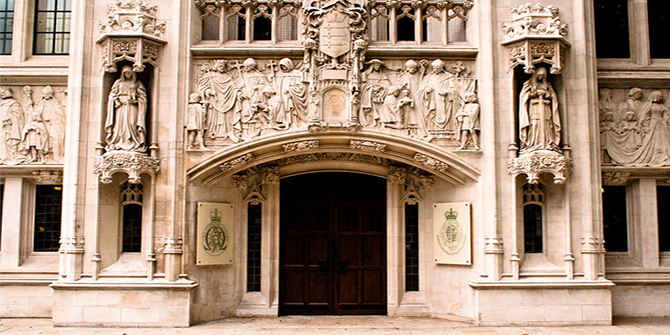 Brexit may have aborted the careers of David Cameron, George Osborne, and all the main Brexit leaders. But rest assured, the reality is worse writes Jean-Paul Faguet. The referendum was a toxic measure that leaves the new government in an impossible situation, damned whatever it does. And although the UK’s uncodified constitution provides guidance on many issues, we nonetheless lack clear ground rules for how decisions of the highest national importance must be taken.
Brexit may have aborted the careers of David Cameron, George Osborne, and all the main Brexit leaders. But rest assured, the reality is worse writes Jean-Paul Faguet. The referendum was a toxic measure that leaves the new government in an impossible situation, damned whatever it does. And although the UK’s uncodified constitution provides guidance on many issues, we nonetheless lack clear ground rules for how decisions of the highest national importance must be taken.
Leaving the EU will inevitably decrease employment, increase poverty, and undermine British power and prestige. It may also end the 300-year-old union with Scotland. (Last year’s Scottish referendum pitted Scots’ hearts against their heads. Brexit aligned the two.) Most MPs understand this, which is why they supported Remain. By contrast, many Brexit voters do not understand. They were promised easy access to the common market, no free movement of people, and more money for the NHS. When the impossibility of that combination sinks in, voters will become angrier than they are now at the lies they were told.
But the alternative – setting aside the Leave vote – is surely worse. Having been told the nation’s fate was in their hands, voters would react to betrayal with levels of anger unlike anything yet witnessed. Already suspicious of politicians and metropolitan elites, people will become enraged that the referendum was, in effect, a hoax. The effect would transcend specific politicians and parties, and undermine faith in democracy itself. At a time when Europe is buffeted by economic and migratory shocks, and the siren call of right-wing populism rings loud on both sides of the Atlantic, this alternative should provoke horror.
How on earth did we get here? Like automobiles, medications, and financial securities, unregulated democracy can be dangerous. Constitutions regulate democracy. But the UK doesn’t really have one.
The proximate cause of the debacle is the amateurism of David Cameron and his team, who promised an EU referendum with feckless disdain for consequence. Faced with a hundred Tory MPs who complained loudly about Europe, Cameron launched a referendum to buy their silence. This is an instant-classic example of what Mahvish Shami and I call “instrumental incoherence”: when politicians pursue discrete, short-term objectives via deep institutional changes whose effects are long-term, multidimensional, and highly unpredictable. The key point is that the goal politicians seek – no Tory infighting over Europe – may be completely unrelated to the effects their reform – leaving the EU – are likely to have. The logic of instrumental incoherence makes exaggerated, or even false, claims in support of reform even more likely, as we have seen.
But the deeper cause is both more important and more interesting: the UK has no written constitution, and so no clear rules for how such matters should be decided. I have had spirited discussions with sophisticated lawyers who point to reams of books in academic libraries and assure me a UK Constitution does exist. June 23rd gives the lie to that view. It shows clearly why tradition and unwritten norms do not suffice. Without doubt, Britain’s unwritten – and hence informal – constitution provides guidance on many questions. But it is incomplete. On a number of important issues it is either silent or – worse – ambiguous. Without a written constitution that everyone can see, the nation lacks clear ground rules for how the state should be structured, where the bounds of democratic contestation lie, and how decisions of the highest national importance should be taken.
Hence Cameron’s decision to subject EU membership to a 50%-plus-one referendum was perfectly legal. But it was also perfectly foolish. In principle, any referendum could be won by a single vote. Does anyone seriously think such questions should hang on one-vote majorities? If not, why invoke such a mechanism? Imagine what would follow a referendum won by one vote? This is no way to run a country.
In most mature democracies, institutional reforms require higher bars of approval, and often extended processes of ratification. A plebiscite may be involved, but one result is not decisive. The question put to the British people recently is not like selecting this year’s favourite song or even choosing the national mascot. It is, rather, a deep structural issue that will affect the nation’s politics, economy, and international relations for generations to come. It is much more akin to amending a constitution, which in the US requires two-thirds super-majorities in both houses of Congress, and separate approval by three-fourths of the states. This is a much, much higher hurdle than 50%-plus-one, and well it should be. The point is not only to increase the difficulty of approving big changes, but also to reveal large, stable majorities for these changes across different aggregations of the electorate. If such majorities do not exist, the reform will fail. Where deep changes to institutions are concerned, this is correct.
Constitutions protect democracy from its own extremes, and the loss of legitimacy that follows. The EU referendum was the democracy bomb that blew up the government and may yet break up the country. God knows how, or if, the situation can be remedied. But if it leads the UK to write, debate, and agree a Constitution, at least it will have done some good.
____
 Jean-Paul Faguet is Professor of the Political Economy of Development at the Department of International Development, LSE, where he is programme director of the MSc in Development Management. He is also Chair of the Decentralization Task Force of the Initiative for Policy Dialogue at Columbia University.
Jean-Paul Faguet is Professor of the Political Economy of Development at the Department of International Development, LSE, where he is programme director of the MSc in Development Management. He is also Chair of the Decentralization Task Force of the Initiative for Policy Dialogue at Columbia University.









It’s not really possible to have a constitutional crisis – in the sense you mean – in the UK, because our constitutional is so purely political. We will leave the EU if it is politically possible to do so. We will not – after all – leave if it is not politically possible. Your article does actually recognise this – now you should embrace that state affairs as the beautifully realistic – and flexible – system that it is!
“Leaving the EU will inevitably decrease employment, increase poverty, and undermine British power and prestige.” It will not do any of these things It will increase employment , decrease poverty, and give us more power than we have being ruled by the unelected committee in brussels, that single sentence by the author shows this is just another piece by a remoaner.
Please explain your answer in some more detail.
Where do your clairvoyant abilities hail from? What do you think will happen and why? Given that no one knows what is going to happen I would be interested to know why you feel so confident?
Facts please, or at least a highly structured and reasonable argument.
I think the EU is a sinking ship but the way we are leaving was both undemocratic and had no preparation.
Piss poor preparation generally leads to piss poor performance.
This is an excellent article. The best way to preserve the United Kingdom could be to (a) formalize the devolution of powers to an English house of Commons and to assemblies or parliaments in Scotland, Wales, Northern Ireland, Gibraltar, the Isle of Man, and the Channel Islands (b) create a federal Senate or House of Lords with a mechanism to ensure that the English majority does not drown the other populations. Unfortunately Blair undermined cabinet government, and did not consider the logical consequences of partial devolution; he was no lawyer, and had no sense of historical direction. Cameron, an admirer of Blair, acted frivolously and irresponsibly, and again had no sense of history or of the fragility of our unwritten constitution. It is arguable that the Brexit referendum was the biggest political mistake made by the British state since we decided to tax the Americans’ tea in 1773. We should by now have accepted that we had lost an empire, and found a role within Europe.
Dangerously clumsy article.
There are other arguments for a written constitution but how would it prevent the present situation, which results from the movements of voter and party opinion? Even with proportional voting we would still have had this ref, when Tory + UKIP was practically half the popular vote and you add to that Democratic Unionist and the Labour Outers.
So his only argument is for a written constitution to include, dangerously hard to change, threshold quotas in referendums. Which hypocritically have suddenly become popular because of a disliked result, in the reform scene that previously found them anathema. Threshold quotas have been discredited since the notorious experience of the 40% rule for devolution in 1979. Its result, of a Yes vote in Scotland treated as a No, directly caused the vote of confidence against Callaghan and put Thatcher into govt. Do you call it wrong for Wales to get the devolution it voted for by only 0.3%! 6000 votes, in 1997, which Wales has liked having and voted much more strongly to increase its powers in 2011? Do you want to face a threshold for getting proportional voting? How will you feel if it falls despite a vote favouring it?
Your argument about the need for referendums to be part of an established constitutional framework, the referendum is a comparatively recent innovation in British culture, and one which we clearly have not become comfortable with, but the proposed supermajorities do not follow.
Supermajorities replace one potential absurdity (the 50%+1 majority) with another (the 60%-1 minority – substitute your proposed size). The parliamentary supermajority has been inserted into British politics through the Fixed Term Parliaments Act and 2016 Scotland Act with no more debate than the principle of “constitutional” referendums. If you are to advocate supermajorities you should argue why more moderate protections are insufficient.
The minimum protection against our current mess would be for referendums to be based on clear propositions with majority parliamentary backing. The Scottish Independence, and Scottish Devolution referendums would both have qualified, in each case the government was not casting opinion but seeking support for a proposition. If the Scottish Independence referendum had succeeded the SNP Scottish Government would have had a mandate on a proposition they themselves brought, and would have had a mandate to figure out the details. The Scottish devolution referendum followed this model with the Labour Government enacting a proposition that had majority assent in Parliament as well as a popular endorsement.
Neither the AV nor EU referendums would have qualified. AV had the advantage of being brought on a fairly clear proposition, but I doubt a majority of parliamentarians backed AV. The EU referendum had neither a clear proposition nor parliamentary majority. If it had had a parliamentary majority those parliamentarians would have had responsibility for defining the concept before it went to the popular vote, and would have been rightly responsible for the consequences.
As a proposal this protects the role of a simple popular vote on certain matters of constitutional importance, but protects parliamentary sovereignty. It is also based on existing constitutional tradition and precedence from well run referendums, learning the lessons of less successful experiments.
No doubt if remain had won then instrumental incoherence would instead be instrumental coherence and this article wouldnt have even been written.
With regards the argument about the pros and cons (although this author fails to go to that depth despite being a lead ‘expert’) then the difference between a codified and uncodified constitution is one that could be an interesting debate.
However as usual the matter of pro or con is what is in the actual constitution and so it is in the contents whether a constitution ‘regulates’ democracy or not. So for example the US constitution effectively makes gun policy an unchanging law. So in the US premeditated violence in the regulator of democracy. Mmm great!
The trouble with codified constitutions they are extremely hard to change which is exactly why Brexit was the best thing that could have happened for the UK. Uncodified constitutions can quite easily absorb episodes of popular sovereignty and as a result uncodified constitutions are much more embracing of evolving forms of governance and as such are able to transmit deeper forms of democracy by refering decisions to the present rather than some ready-made past.
EU treaties of course resemble codified constitutions are they are used to lock eu countries into unadaptable economic and fiscal policy hence why there is a deep economic and social crisis in Europe. Interestingly the same european countries that have codified constitutions. At the end of the day, the UK is based on a common law legal system. I’d prefer to keep it that way so that the common people can have their equal say. Codified constitutions just structurally bias the system towards establishment elites and we in the UK dont want that codified thanks. We like to keep things fresh. But there are plenty of other European countries to live if codified structural bias is your thing.
A written constitution might also protect the rights of minorities, if they were included. But then would that depend upon a majority vote to approve protection? Minorities have some firm protections through Britain’s membership of the EU, and us thereby being EU Citizens, with the EU Parliament, the Council of Ministers, and all the parliaments of the member states having to agree changes. But Brexit – at a close 48-52% vote, after hateful and misleading campaigning – would tear those away.
“But the alternative – setting aside the Leave vote – is surely worse.”
On the contrary, Liberal (Representative) Democracy is built upon minority-rule. At each and every election the majority loses out.
It may be shame-making to admit that this experiment (toying with) Direct Democracy cannot override our fundamental LD principles, but such can and should be done.
Like the child left alone in a room with a sweetie – and the promise of more sweeties, just as long as they leave the one untouched, cannot resist the treat in front of them:So the temptation for those elected to ‘Govern’ to instead act as Monarchs, is too often irresistible.
On the up-side: Who knows, but utter failure with Brexit, may provide us all with the will to press for a Written Constitution. Where we could find anybody in a position to press-ahead with such a thing – given the Party Political options before us, is a puzzle, but no mere distraction.
The several stages by which the UK has been integrated with the EU, each of which have amounted to major constitutional change, have requiredd only simple majorities in Parliament. However, you have no words of criticism for those processes in this article: can you point me to an equally passionate article of yours criticising the constitution on those previous occasions?
The reference to 50%+1 as changing the constitution is incomplete. To carry out change of this sort, the process includes Parliament initiating the referendum, the referendum itself, and then in due course Parliamentary majorities passing the requisite legislation in two or three years time. The referendum vote of itself changes nothing.